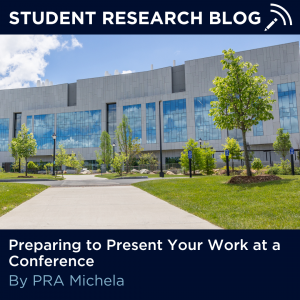By Michela Brown, Peer Research Ambassador
 Presenting at a conference can be an exhilarating yet nerve-wracking experience. This past January I had the opportunity to share my research at the Plant and Animal Genome conference in San Diego. It was the first time I presented my research, especially in front of scientists who share opposing or similar interests. I had a lot of anxiety and uncertainty when preparing to attend the conference, and I wanted to share some personal insight on how to make the most of your experience.
Presenting at a conference can be an exhilarating yet nerve-wracking experience. This past January I had the opportunity to share my research at the Plant and Animal Genome conference in San Diego. It was the first time I presented my research, especially in front of scientists who share opposing or similar interests. I had a lot of anxiety and uncertainty when preparing to attend the conference, and I wanted to share some personal insight on how to make the most of your experience.
Building Confidence through Preparation
Confidence doesn’t come overnight; it’s built through preparation. When applying to present, you will have to submit an abstract (summary of your research) months before you attend. It is good to have the data you want to present completed before writing or submitting your abstract. This will allow you to know you are certain you will be presenting what you write about. Also, I encourage you to begin writing your abstract about one month before it is due to allow your Principal Investigator (PI) and co-authors to review what you have. You will typically have at least two months from the abstracts due date to form your poster before the conference date. It’s a great idea to use that time wisely and spend a few minutes a day organizing your layout, coming up with key ideas to add, or forming your data charts and graphs. I know from personal experience not to wait until the last few weeks to finish or even start preparing to present at a conference. I didn’t finish my poster for the one I attended until the week before I left and had to strategize how to have my poster printed before I flew across the country. I received my poster the day before my flight, and I felt an immense amount of stress that carried into the beginning of my trip. I felt unorganized and unprepared but managed to make the most of my experience after some time.
Poster Printing and Practice
One of the most critical aspects when attending a conference is presenting your work. There are people who attend conferences to listen to what others are working on, but a lot of people use them for their poster exhibitions to show off their most recent accomplishments and ideas. As I said before, it is a great idea to begin working on your poster as soon as possible. I suggest printing your finalized poster at least two weeks before you leave to review it for any errors, design issues, or to make any adjustments. Also, it is a great idea to practice your poster in a comfortable environment before you arrive. You can present your work to family members, roommates, friends, or even people you work in your lab with. The goal is to become comfortable with the format and information on your poster, and to guide others through your story.
Crafting a Quick Summary
Summarizing my research in a clear and concise way was a key part of my preparation. I wrote down the main ideas and takeaways of my presentation in a notebook that I would bring with me to the conference and refer to at the exhibition. I would use this summary as an “elevator pitch” and was incredibly useful when introducing myself and my research to those interested in my work. It also came in handy to write down anything I learned throughout the different talks, or to write the contact information of people I met.
Anticipating Questions
Not only would it be great to form a summary of your work and your elevator pitch, but it would be helpful to anticipate questions that could be asked. When people stop to read your poster or listen to your talk, it is their first time hearing about what you’re working on. Some of them might have questions, suggestions, or even challenge your work and thoughts. This is all normal because there are many types of people at conferences, and they would like to learn more about you through your work. So, having confidence in your answers, or even the confidence in saying you are not sure will help to make you feel better. Discussing possible questions with colleagues, mentors, or even friends was extremely helpful; it gives you different perspectives of how your work and pitch is viewed through different lenses and what you could improve on.
Presenting at a conference is a rewarding challenge that requires a good amount of preparation but is also a worthwhile experience. Spending quality time beforehand to prepare and ensure you can feel good about presenting your poster and will give you a sense of relief as you go about the events at the conference. There are so many resources and people around you that would be willing to help if you just ask. Remember, your poster exhibition is only one portion of the conference; you will learn so much and meet many people while attending a conference. If you’re preparing for a similar journey, remember to embrace and enjoy every part of it as your own unique experience.
Michela is a senior majoring in Biology and minoring in Animal Science and Molecular & Cell Biology. Click here to learn more about Michela.